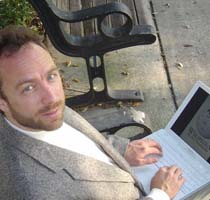 Wikipedia founder Jimmy Wales has made an excellent response to the fallout from the Seigenthaler incident, in an interview on Media Giraffe.
Wikipedia founder Jimmy Wales has made an excellent response to the fallout from the Seigenthaler incident, in an interview on Media Giraffe.The episode has thrown a spotlight on the old school versus new journalism debate. John Seigenthaler was absolutely right to be 'surprised and hurt' about the bogus information written about him on Wikipedia, but the real test for Wikipedia was in how it dealt with problem and on that level, the site responded well. What Craig Newmark of Craigslist would call 'customer service'.
Firstly, Mr Wales said the Seigenthaler story revived a legal question that was resolved 10 years ago: to what extent is the publisher responsible for content submitted or edited by its users?
Either the publisher is entirely responsible, in which case the platforms for discussion would be handicapped by moderation: "A death blow to the open conversation that is the internet," he said. Or the publisher has no responsibility at all, which is equally unworkable. The middle ground is that publishers have a duty to respond to complaints and that is what Wikipedia did. But it went further.
"The interesting thing about Wikipedia as opposed to message boards and blogs is that we have a very strong community. [The Community] does consider whatever the law is, and has an intellectual and ethical responsibility that goes beyond what the law requires of the website," said Mr Wales.
"Mr Seigenthaler argued that unless something was done about this, congress would crack down on free speech. I think that's ridiculous.
"We didn't respond to Mr Seigenthaler by saying we're not legally responsible; we responded by saying this is really bad and a huge error. The fact that this slipped through the cracks is deeply disturbing to our own community."
Mr Seigenthaler might 'tsk' at that, but it seems unlikely that he is completely familiar with the complex social network of a project like Wikipedia. It is a new language, a new system of conventions on how to collaborate with a vast community.
"It seems strange that when people can go to any page of Wikipedia and delete or trash pages that it doesn't happen more often. But we leave our cars parked outside and normally they don't get trashed. We experience a benevolent society all the time and expect people to behave appropriately," he said.
"The problems are worth it given the freedom we have."
There is a common assumption, an underlying expectation that the physical disconnection of web-based communities somehow undermines the intellectual credibility of what they produce, but why should that be? My experience has been that Wikipedia contributors - as well as its users - are far more sophisticated than the uninitiated want to believe.
So why is there so much snobbery about participatory journalism?
During an interview with C-Span, Seigenthaler made a mistake by straying into commentary of online conventions, mocking the names of Wikipedia contributors. Mr Wales pointed out that the three people he picked out were an artificial intelligence researcher, a contributor that speaks six languages and another whose 'wacky' user ID happened to be a common Slovenian name.
That false assumption illustrates the 'generation gap', said Mr Wales.
It could be argued that the public has not been questioning enough of its media, too passive in its consumption of news and information.
Participatory journalism - from community news and information sites to on-demand services - encourages people to engage with and contribute to the world around them.
If they are encouraged to contribute responsibly, questioning and fact-checking what they read and contribute to, that must be a positive change for the news industry. This will lead to a more challenging, better-informed audience and a new era of conversational media.
Comments? Email me.
More news from journalism.co.uk:
Wikipedia prankster confesses to false posting
Oil depot fires put citizen journalists to the test
Journalism stalwart condemns 'flawed' Wikipedia
Switching on to democratic citizen media
Citizen journalism: Dealing with dinosaurs
The darker side of citizen journalism
Wikinews supercharged by London bombings coverage
Free daily newsletter
If you like our news and feature articles, you can sign up to receive our free daily (Mon-Fri) email newsletter (mobile friendly).
Related articles
- 'Lords review of media is in danger of achieving nothing'
- 'None of the papers have grasped the fundamental difference between the internet and print'
- 'Journalists are too often reduced to a cross between call-centre workers and data processors'
- 'UK offline media is one of the most competitive and creative in the world. You have to ask why that hasn't followed online'
- '40,000 citizen journalists working to report one story for your paper? It's possible, we did it'









